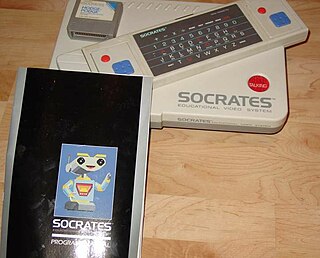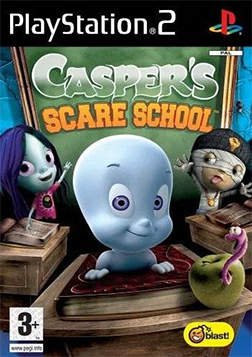
A video game, also known as a computer game, is an electronic game that involves interaction with a user interface or input device – such as a joystick, controller, keyboard, or motion sensing device – to generate audiovisual feedback. This feedback is most commonly shown on a video display device, such as a TV set, monitor, touchscreen, or virtual reality headset. Some computer games do not always depend on a graphics display; for example, text adventure games and computer chess can be played through teletype printers. Video games are often augmented with audio feedback delivered through speakers or headphones, and sometimes with other types of feedback, including haptic technology.

Scholastic Corporation is an American multinational publishing, education, and media company that publishes and distributes books, comics, and educational materials for schools, teachers, parents, and children. and other Educational Institutions. Products are distributed via retail and online sales and through schools via reading clubs and book fairs. Clifford the Big Red Dog, a character created by Norman Bridwell in 1963, serves as Scholastic's official mascot.
Educational software is a term used for any computer software which is made for an educational purpose. It encompasses different ranges from language learning software to classroom management software to reference software. The purpose of all this software is to make some part of education more effective and efficient.
Educational games are games explicitly designed with educational purposes, or which have incidental or secondary educational value. All types of games may be used in an educational environment, however educational games are games that are designed to help people learn about certain subjects, expand concepts, reinforce development, understand a historical event or culture, or assist them in learning a skill as they play. Game types include board, card, and video games.
BrainPop is a group of children's educational websites based in New York City. It hosts over 1,000 short animated movies for students in grades K–12, together with quizzes and related materials, covering the subjects of science, social studies, English, math, engineering and technology, health, arts and music. In 2022, Kirkbi A/S, the private investment and holding company that owns a controlling stake in Lego, acquired BrainPop.

The V.Smile is a sixth-generation educational home video game console manufactured and released by VTech. Titles are available on ROM cartridges called "Smartridges", to play off the system's educational nature. The graphics are primarily sprite-based. The console is often sold bundled with a particular game, with most of them having a game called Alphabet Park Adventure. Several variants of the V.Smile console are sold including handheld versions, or models with added functionality such as touch tablet integrated controllers or microphones. The V-Motion is a major variant with its own software lineup that includes motion sensitive controllers, and has Smartridges designed to take advantage of motion-related "active learning". The V-Motion and Smartridges however, are fully backwards compatible with other V.Smile variants and V.Smile Smartridges, and a V-Motion Smartridge can also be played on V.Smile console or handheld, albeit with limited functionality. In 2010, the new and old models of the V.Smile were discontinued. VTech still made games for the V.Smile until 2012.

An educational video game is a video game that provides learning or training value to the player. Edutainment describes an intentional merger of video games and educational software into a single product. In the narrower sense used here, the term describes educational software which is primarily about entertainment, but tends to educate as well and sells itself partly under the educational umbrella. Normally software of this kind is not structured towards school curricula and does not involve educational advisors.

Carmen Sandiego is a media franchise based on a series of computer games created by the American software company Broderbund. While the original 1985 Where in the World Is Carmen Sandiego? video game was classified as a "mystery exploration" series by creators and the media, the series would later be deemed edutainment when the games became unexpectedly popular in classrooms. The franchise centers around the fictional thieving villain of the same name, who is the ringleader of the criminal organization, V.I.L.E.; the protagonists are agents of the ACME Detective Agency who try to thwart the crooks' plans to steal treasures from around the world, while the later ultimate goal is to capture Carmen Sandiego herself.

Shin Megami Tensei: Devil Children, also known as DemiKids, is a series of role-playing video games primarily developed by Multimedia Intelligence Transfer and published by Atlus. It is a spin-off from Atlus' Megami Tensei franchise, and began in 2000 with the Game Boy Color games Black Book and Red Book. Five more role-playing games and three games in other genres were released until 2004, followed by no new releases until the 2011 social game Shin Megami Tensei: Devil Children. In addition to the games, the series has been adapted into manga, anime, and a trading card game, and two soundtrack albums have been released by First Smile Entertainment.

The term digital native describes a person who has grown up in the information age. Often grouped into Millennials, Generation Z, and Generation Alpha, these individuals can consume digital information and stimuli quickly and comfortably through electronic devices and platforms such as computers, mobile phones, and social media.
A serious game or applied game is a game designed for a primary purpose other than pure entertainment. The "serious" adjective is generally prepended to refer to video games used by industries like defense, education, scientific exploration, health care, emergency management, city planning, engineering, politics and art. Serious games are a subgenre of serious storytelling, where storytelling is applied "outside the context of entertainment, where the narration progresses as a sequence of patterns impressive in quality ... and is part of a thoughtful progress". The idea shares aspects with simulation generally, including flight simulation and medical simulation, but explicitly emphasizes the added pedagogical value of fun and competition.

Casper's Scare School is a series of three video games based on the computer animated film and TV series of the same name. The plot of the games involve Casper the Friendly Ghost who having been sent to "Scare School" by his three uncles, must thwart plots by the school bully Thatch the vampire's plan to turn all the characters to stone, stop Casper helping his classmates or stealing all the glory in the school sports day.

The Joan Ganz Cooney Center is an independent, non-profit, non-partisan research and innovation group founded by Sesame Workshop to advance children's literacy skills and foster innovation in children's learning through digital media.
The Magic School Bus is a series of educational software video games developed by Music Pen and published by Microsoft via their Microsoft Home brand. The interactive adventures are part of the larger franchise and based on The Magic School Bus book series and public television series.

My Little Pony: Friendship Is Magic is a video game based on the animated television series of the same name, which was developed by Gameloft for iOS and Android devices and is recommended at children aged 5 to 12. The game was released on November 8, 2012.
Jeopardy! is an American media franchise that began with a television quiz show created by Merv Griffin, in which contestants are presented with clues in the form of answers, and must phrase their responses in the form of a question. Over the years, the show has expanded its brand beyond television and been licensed into products of various formats.

The gamification of learning is an educational approach that seeks to motivate students by using video game design and game elements in learning environments. The goal is to maximize enjoyment and engagement by capturing the interest of learners and inspiring them to continue learning. Gamification, broadly defined, is the process of defining the elements which comprise games, make those games fun, and motivate players to continue playing, then using those same elements in a non-game context to influence behavior. In other words, gamification is the introduction of game elements into a traditionally non-game situation.

Kahoot! is a Norwegian game-based learning platform, used as educational technology. It has learning games, also known as "kahoots", are user-generated multiple-choice quizzes that can be accessed via a web browser or the Kahoot! app. Kahoot! also includes trivia quizzes. This educational platform is similar to other technological learning tools such as Wooflash, Blooket, Quizizz, Gimkit, or Quizlet.
Madeline is a series of educational point-and-click adventure video games which were developed during the mid-1990s for Windows and Mac systems. The games are an extension of the Madeline series of children's books by Ludwig Bemelmans, which describe the adventures of a young French girl. The video-game series was produced concurrently with a TV series of the same name, with characters and voice actors from the show.











